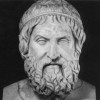If all public questions were settled by shooting dice, fifty percent of them would be settled correctly. This would be five times as good a score as we make now.
H. L. Mencken (1880-1956) American writer and journalist [Henry Lewis Mencken]
A Little Book in C Major, ch. 3, § 19 (1916)
(Source)
Quotations about:
public policy
Note not all quotations have been tagged, so Search may find additional quotes on this topic.
The effect of the religious freedom Amendment to our Constitution was to take every form of propagation of religion out of the realm of things which could directly or indirectly be made public business, and thereby be supported in whole or in part at taxpayers’ expense. That is a difference which the Constitution sets up between religion and almost every other subject matter of legislation, a difference which goes to the very root of religious freedom and which the Court is overlooking today. This freedom was first in the Bill of Rights because it was first in the forefathers’ minds; it was set forth in absolute terms, and its strength is its rigidity. It was intended not only to keep the states’ hands out of religion, but to keep religion’s hands off the state, and, above all, to keep bitter religious controversy out of public life by denying to every denomination any advantage from getting control of public policy or the public purse.
Robert H. Jackson (1892-1954) US Supreme Court Justice (1941-54), lawyer, jurist, politician
Everson v. Board of Education, 330 U.S. 1, 26-27 (1947) [dissent]
(Source)




